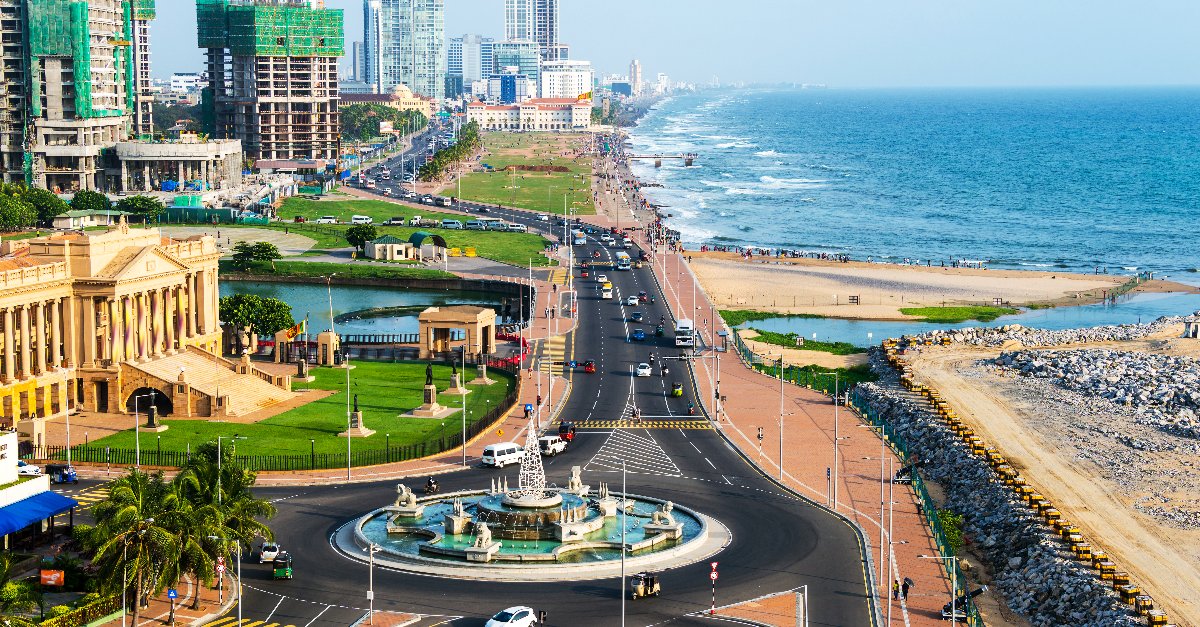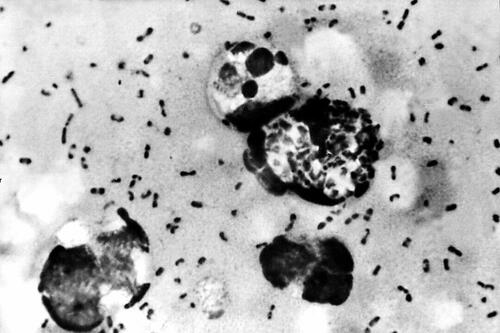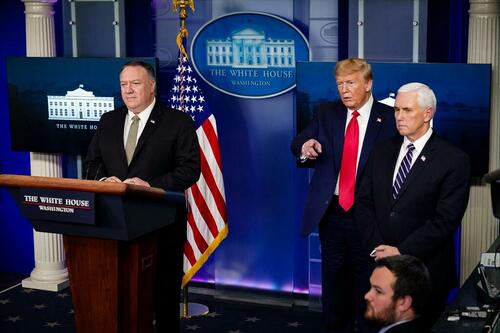Government
A breakdown of Sri Lanka’s interim budget amid an economic meltdown
Sri Lanka is in a period of great flux. The breathtaking beauty of the island nation has, unfortunately, often been overshadowed by political instability,…

Sri Lanka is in a period of great flux. The breathtaking beauty of the island nation has, unfortunately, often been overshadowed by political instability, ethnic conflict and civil unrest.
With the end of the civil war in 2009, there was widespread optimism in the international community that Sri Lanka may take steps towards greater economic prosperity.
However, a decade later, the country found itself face-to-face with an economic crisis once more. These rumblings worsened exponentially due to the implementation of misguided agricultural and taxation policies, racking up of external debt, a plummeting rupee and of course, the onset of the pandemic which wreaked havoc across sectors.
Although the economic crisis is usually considered to have begun in 2019, W.A.Wijewardena, a former Deputy Governor of the Central Bank of Sri Lanka notes that” in 2015, Sri Lanka was in a deep economic crisis.”
Exports had already begun to stagnate while Sri Lanka, being an island, saw its import costs rise. The deteriorating trade deficit (exports minus imports) is shown in the graph below. Many of these imports comprised the most essential items including food grains, medicines and fuel. This began to pinch the common householder as the business environment grew darker.

When the pandemic was first declared in 2020, Sri Lanka’s tourism sector, the country’s third largest foreign exchange earner, was particularly badly hit, with international travel coming to a complete standstill by April. Moreover, the stress on local transport and logistical resources meant that supply chains were heavily compromised.
With the surge in inflation and global market uncertainty, capital outflows were thick and fast, considerably weakening the LKR against the USD.

With severe weakness in the domestic currency and waning foreign exchange reserves, the government was forced to borrow from the international markets, adding to its already sizeable interest payments.
With the fall of the Rajapaksha government, newly-appointed FM and six-time PM, Wickremesinghe, must organize the restructuring of the economy and crucially, place the country in a financial position to enable IMF funding.
Budget highlights
The priority for the government is to rein in inflation, which was registered at 60.8% in July 2022, the highest level in Asia, exacerbated by historic levels of money printing, and a surge in capital outflows.
Although expectations were of a sizeable cut of a “few hundred billion” in expenditure, net expenditure has increased sharply, amid fresh relief measures and additional outlay by the government.
Total expenditure (which comprises both revenue expenditure for administrative purposes such as government salaries and funds allotted for public services such as administration, defence and health; and capital expenditure which creates new assets such as ports, highways and bridges) is projected to rise to LKR 4.4 trillion compared to the earlier estimate of LKR 3.9 trillion.
At the same time, revenues are projected to fall to LKR 2 trillion against the last budget’s estimate of LKR 2.23 trillion.
Given the widening budgetary deficit (revenues down, while expenditures rise), the budgetary deficit was earlier projected at 8.8% of GDP but has been revised upwards to 9.8%.
Much like the budgetary deficit, the primary deficit is another measure which is frequently used to assess the health of an economy. The primary deficit measures expenditure minus revenues but excludes interest payments. This highlights the flow of funds that the government receives versus how much it spends on core aspects of the economy, especially on goods and services.
This deficit is projected to fall to 4% of GDP compared to 5.7% in 2021, which will be a challenging task as growth is expected to contract sharply this year, by an estimated 8%. This implies that taxes (the primary avenue for the government’s revenue collection) will likely not be sufficient due to lower economic activity.
In the medium term, Wickremesinghe has pledged to reach a 2% primary surplus by 2025, a tall ask as the economy is yet to show any positive signs of recovery and a dearth of investable opportunities.
Key points
The reality is that given the financial predicament faced by the government, authorities will have few options but to rely on international funds in the near to medium term.
One of the central aims of the budget is to move the economy towards a point where budgetary ratios are in line with global expectations while authorities attempt to negotiate an emergency loan of around $3 billion with the IMF.
Fiscal Reforms:
- VAT to be increased to 15% from September. Currently, this stands at 12%.
- Crucially, the FM proposed the establishment of a new public mechanism to aid in the restructuring of the loss-making Sri Lankan Airlines. Wickremesinghe allocated 200 million LKR should be earmarked for this initiative.
- The new government also proposed to set up a new facility to attract foreign investments from the Sri Lanka diaspora, a crucial step to defend the rupee.
- All persons aged 18 and above will have to register for income tax purposes.
Agriculture and animal husbandry:
- LKR 32 million is proposed to be set aside for farmers who have struggled amid the pandemic. Although the agricultural sector has struggled over the past few years, it has been especially dented by a sudden, mandatory and ill-planned shift to organic farming. This has resulted in crashing yields, falling 30% in the case of rice, the staple crop.
- An additional, 40 billion LKR will be allotted to the agricultural sector with the support of US development agencies.
- In a major relief to farmers, the FM proposed waiving LKR 600 million in debt from the agricultural sector, although accruing interest will still be payable.
- LKR 200 million will be allocated for the much-needed development of the dairy industry, while another LKR 50 million will be directed towards animal husbandry and associated projects.
- The government has also recommended special tax relief for factories that are involved in the processing and packaging of local agricultural products.
Tourism and skill development:
- A 5-member committee is to be established to rejuvenate the luxury tourism sector.
- LKR 300 million is to be allotted to broader tourism projects.
- In light of the severe lack of trained workforce in Sri Lanka, the government has decided to outline steps to encourage more foreign students (this too is to defend the LKR with an inflow of more foreign capital), establish a new state-of-the-art university campus and promote skilling through Vocational Training Institutes.
Welfare and monetary measures:
- Sizeable allocations for poor families and pregnant mothers.
- Introduction of a bill to create a contributed pension fund for all workers.
- Proposed to introduce new institutional regulations to boost the independence of the central bank, a talking point in recent years in Sri Lanka.
- Focus on driving inflation down to mid-single digit levels along with a medium-term target of achieving 5% GDP growth.
With the opening up of global tourism and Sri Lanka’s relatively inexpensive labour, the government must leverage these strengths to begin rebuilding the economy.
Although Wickremesinghe has come to power, many commentators believe that given that Rajapaksha’s party still controls the majority in parliament, the new government may have a challenging time finding support for its new economic vision.
In a positive development, there is an expectation that the IMF and government of Sri Lanka’s talks are reaching a “successful-level.“
In November later this year, the government is expected to present a full-year budget that will hopefully shed more light on the country’s future economic roadmap.
The post A breakdown of Sri Lanka’s interim budget amid an economic meltdown appeared first on Invezz.
governor pandemic gdp recoveryGovernment
Health Officials: Man Dies From Bubonic Plague In New Mexico
Health Officials: Man Dies From Bubonic Plague In New Mexico
Authored by Jack Phillips via The Epoch Times (emphasis ours),
Officials in…

Authored by Jack Phillips via The Epoch Times (emphasis ours),
Officials in New Mexico confirmed that a resident died from the plague in the United States’ first fatal case in several years.

The New Mexico Department of Health, in a statement, said that a man in Lincoln County “succumbed to the plague.” The man, who was not identified, was hospitalized before his death, officials said.
They further noted that it is the first human case of plague in New Mexico since 2021 and also the first death since 2020, according to the statement. No other details were provided, including how the disease spread to the man.
The agency is now doing outreach in Lincoln County, while “an environmental assessment will also be conducted in the community to look for ongoing risk,” the statement continued.
“This tragic incident serves as a clear reminder of the threat posed by this ancient disease and emphasizes the need for heightened community awareness and proactive measures to prevent its spread,” the agency said.
A bacterial disease that spreads via rodents, it is generally spread to people through the bites of infected fleas. The plague, known as the black death or the bubonic plague, can spread by contact with infected animals such as rodents, pets, or wildlife.
The New Mexico Health Department statement said that pets such as dogs and cats that roam and hunt can bring infected fleas back into homes and put residents at risk.
Officials warned people in the area to “avoid sick or dead rodents and rabbits, and their nests and burrows” and to “prevent pets from roaming and hunting.”
“Talk to your veterinarian about using an appropriate flea control product on your pets as not all products are safe for cats, dogs or your children” and “have sick pets examined promptly by a veterinarian,” it added.
“See your doctor about any unexplained illness involving a sudden and severe fever, the statement continued, adding that locals should clean areas around their home that could house rodents like wood piles, junk piles, old vehicles, and brush piles.
The plague, which is spread by the bacteria Yersinia pestis, famously caused the deaths of an estimated hundreds of millions of Europeans in the 14th and 15th centuries following the Mongol invasions. In that pandemic, the bacteria spread via fleas on black rats, which historians say was not known by the people at the time.
Other outbreaks of the plague, such as the Plague of Justinian in the 6th century, are also believed to have killed about one-fifth of the population of the Byzantine Empire, according to historical records and accounts. In 2013, researchers said the Justinian plague was also caused by the Yersinia pestis bacteria.
But in the United States, it is considered a rare disease and usually occurs only in several countries worldwide. Generally, according to the Mayo Clinic, the bacteria affects only a few people in U.S. rural areas in Western states.
Recent cases have occurred mainly in Africa, Asia, and Latin America. Countries with frequent plague cases include Madagascar, the Democratic Republic of Congo, and Peru, the clinic says. There were multiple cases of plague reported in Inner Mongolia, China, in recent years, too.
Symptoms
Symptoms of a bubonic plague infection include headache, chills, fever, and weakness. Health officials say it can usually cause a painful swelling of lymph nodes in the groin, armpit, or neck areas. The swelling usually occurs within about two to eight days.
The disease can generally be treated with antibiotics, but it is usually deadly when not treated, the Mayo Clinic website says.
“Plague is considered a potential bioweapon. The U.S. government has plans and treatments in place if the disease is used as a weapon,” the website also says.
According to data from the U.S. Centers for Disease Control and Prevention, the last time that plague deaths were reported in the United States was in 2020 when two people died.
Government
Mike Pompeo Doesn’t Rule Out Serving In 2nd Trump Administration
Mike Pompeo Doesn’t Rule Out Serving In 2nd Trump Administration
Authored by Jack Phillips via The Epoch Times (emphasis ours),
Former Secretary…

Authored by Jack Phillips via The Epoch Times (emphasis ours),
Former Secretary of State Mike Pompeo said in a new interview that he’s not ruling out accepting a White House position if former President Donald Trump is reelected in November.
“If I get a chance to serve and think that I can make a difference ... I’m almost certainly going to say yes to that opportunity to try and deliver on behalf of the American people,” he told Fox News, when asked during a interview if he would work for President Trump again.
“I’m confident President Trump will be looking for people who will faithfully execute what it is he asked them to do,” Mr. Pompeo said during the interview, which aired on March 8. “I think as a president, you should always want that from everyone.”
He said that as a former secretary of state, “I certainly wanted my team to do what I was asking them to do and was enormously frustrated when I found that I couldn’t get them to do that.”
Mr. Pompeo, a former U.S. representative from Kansas, served as Central Intelligence Agency (CIA) director in the Trump administration from 2017 to 2018 before he was secretary of state from 2018 to 2021. After he left office, there was speculation that he could mount a Republican presidential bid in 2024, but announced that he wouldn’t be running.
President Trump hasn’t publicly commented about Mr. Pompeo’s remarks.
In 2023, amid speculation that he would make a run for the White House, Mr. Pompeo took a swipe at his former boss, telling Fox News at the time that “the Trump administration spent $6 trillion more than it took in, adding to the deficit.”
“That’s never the right direction for the country,” he said.
In a public appearance last year, Mr. Pompeo also appeared to take a shot at the 45th president by criticizing “celebrity leaders” when urging GOP voters to choose ahead of the 2024 election.
2024 Race
Mr. Pompeo’s interview comes as the former president was named the “presumptive nominee” by the Republican National Committee (RNC) last week after his last major Republican challenger, former South Carolina Gov. Nikki Haley, dropped out of the 2024 race after failing to secure enough delegates. President Trump won 14 out of 15 states on Super Tuesday, with only Vermont—which notably has an open primary—going for Ms. Haley, who served as President Trump’s U.S. ambassador to the United Nations.
On March 8, the RNC held a meeting in Houston during which committee members voted in favor of President Trump’s nomination.
“Congratulations to President Donald J. Trump on his huge primary victory!” the organization said in a statement last week. “I’d also like to congratulate Nikki Haley for running a hard-fought campaign and becoming the first woman to win a Republican presidential contest.”
Earlier this year, the former president criticized the idea of being named the presumptive nominee after reports suggested that the RNC would do so before the Super Tuesday contests and while Ms. Haley was still in the race.
Also on March 8, the RNC voted to name Trump-endorsed officials to head the organization. Michael Whatley, a North Carolina Republican, was elected the party’s new national chairman in a vote in Houston, and Lara Trump, the former president’s daughter-in-law, was voted in as co-chair.
“The RNC is going to be the vanguard of a movement that will work tirelessly every single day to elect our nominee, Donald J. Trump, as the 47th President of the United States,” Mr. Whatley told RNC members in a speech after being elected, replacing former chair Ronna McDaniel. Ms. Trump is expected to focus largely on fundraising and media appearances.
President Trump hasn’t signaled whom he would appoint to various federal agencies if he’s reelected in November. He also hasn’t said who his pick for a running mate would be, but has offered several suggestions in recent interviews.
In various interviews, the former president has mentioned Sen. Tim Scott (R-S.C.), Texas Gov. Greg Abbott, Rep. Elise Stefanik (R-N.Y.), Vivek Ramaswamy, Florida Gov. Ron DeSantis, and South Dakota Gov. Kristi Noem, among others.
International
Riley Gaines Explains How Women’s Sports Are Rigged To Promote The Trans Agenda
Riley Gaines Explains How Women’s Sports Are Rigged To Promote The Trans Agenda
Is there a light forming when it comes to the long, dark and…

Is there a light forming when it comes to the long, dark and bewildering tunnel of social justice cultism? Global events have been so frenetic that many people might not remember, but only a couple years ago Big Tech companies and numerous governments were openly aligned in favor of mass censorship. Not just to prevent the public from investigating the facts surrounding the pandemic farce, but to silence anyone questioning the validity of woke concepts like trans ideology.
From 2020-2022 was the closest the west has come in a long time to a complete erasure of freedom of speech. Even today there are still countries and Europe and places like Canada or Australia that are charging forward with draconian speech laws. The phrase "radical speech" is starting to circulate within pro-censorship circles in reference to any platform where people are allowed to talk critically. What is radical speech? Basically, it's any discussion that runs contrary to the beliefs of the political left.
Open hatred of moderate or conservative ideals is perfectly acceptable, but don't ever shine a negative light on woke activism, or you might be a terrorist.
Riley Gaines has experienced this double standard first hand. She was even assaulted and taken hostage at an event in 2023 at San Francisco State University when leftists protester tried to trap her in a room and demanded she "pay them to let her go." Campus police allegedly witnessed the incident but charges were never filed and surveillance footage from the college was never released.
It's probably the last thing a champion female swimmer ever expects, but her head-on collision with the trans movement and the institutional conspiracy to push it on the public forced her to become a counter-culture voice of reason rather than just an athlete.
For years the independent media argued that no matter how much we expose the insanity of men posing as women to compete and dominate women's sports, nothing will really change until the real female athletes speak up and fight back. Riley Gaines and those like her represent that necessary rebellion and a desperately needed return to common sense and reason.
In a recent interview on the Joe Rogan Podcast, Gaines related some interesting information on the inner workings of the NCAA and the subversive schemes surrounding trans athletes. Not only were women participants essentially strong-armed by colleges and officials into quietly going along with the program, there was also a concerted propaganda effort. Competition ceremonies were rigged as vehicles for promoting trans athletes over everyone else.
The bottom line? The competitions didn't matter. The real women and their achievements didn't matter. The only thing that mattered to officials were the photo ops; dudes pretending to be chicks posing with awards for the gushing corporate media. The agenda took precedence.
Lia Thomas, formerly known as William Thomas, was more than an activist invading female sports, he was also apparently a science project fostered and protected by the athletic establishment. It's important to understand that the political left does not care about female athletes. They do not care about women's sports. They don't care about the integrity of the environments they co-opt. Their only goal is to identify viable platforms with social impact and take control of them. Women's sports are seen as a vehicle for public indoctrination, nothing more.
The reasons why they covet women's sports are varied, but a primary motive is the desire to assert the fallacy that men and women are "the same" psychologically as well as physically. They want the deconstruction of biological sex and identity as nothing more than "social constructs" subject to personal preference. If they can destroy what it means to be a man or a woman, they can destroy the very foundations of relationships, families and even procreation.
For now it seems as though the trans agenda is hitting a wall with much of the public aware of it and less afraid to criticize it. Social media companies might be able to silence some people, but they can't silence everyone. However, there is still a significant threat as the movement continues to target children through the public education system and women's sports are not out of the woods yet.
The ultimate solution is for women athletes around the world to organize and widely refuse to participate in any competitions in which biological men are allowed. The only way to save women's sports is for women to be willing to end them, at least until institutions that put doctrine ahead of logic are made irrelevant.
-

 Uncategorized3 weeks ago
Uncategorized3 weeks agoAll Of The Elements Are In Place For An Economic Crisis Of Staggering Proportions
-

 International6 days ago
International6 days agoEyePoint poaches medical chief from Apellis; Sandoz CFO, longtime BioNTech exec to retire
-

 Uncategorized4 weeks ago
Uncategorized4 weeks agoCalifornia Counties Could Be Forced To Pay $300 Million To Cover COVID-Era Program
-

 Uncategorized3 weeks ago
Uncategorized3 weeks agoApparel Retailer Express Moving Toward Bankruptcy
-

 Uncategorized4 weeks ago
Uncategorized4 weeks agoIndustrial Production Decreased 0.1% in January
-

 International5 days ago
International5 days agoWalmart launches clever answer to Target’s new membership program
-

 Uncategorized4 weeks ago
Uncategorized4 weeks agoRFK Jr: The Wuhan Cover-Up & The Rise Of The Biowarfare-Industrial Complex
-

 Uncategorized3 weeks ago
Uncategorized3 weeks agoGOP Efforts To Shore Up Election Security In Swing States Face Challenges



















